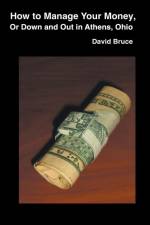von David Bruce
13,00 €
Note: The relationships in this book are of several kinds, not just of Significant Others.¿ When African-American poet Nikki Giovanni was a teenager in Knoxville, Tennessee, people gathered together to protest a hate crime. Nikki's grandmother explained that she and Nikki's grandfather were too old to march in the protest - so to take their place in the march they had volunteered Nikki.¿ While growing up in the 1930s, children's book author Tomie dePaola had two grandmothers and one great-grandmother, all of whom were called Nana. To keep them straight, he referred to Nana Upstairs, because his great-grandmother spent all her time upstairs, and Nana Downstairs, because unless this grandmother was helping Nana Upstairs, she could be found downstairs. There was also Nana Fall River, who lived in Fall River, Massachusetts. Nana Upstairs was 94 years old, and she had to be tied to her chair so that she wouldn't fall off the chair. Young Tomie wanted to be like Nana Upstairs, so when he visited her, he requested that he be tied to his chair, too. Nana Downstairs honored the request, but she always tied the knot in front so that he could untie himself when he wanted to wander around. While wandering around, Tomie looked for and often found candy in a sewing box. One day, no candy could be found, so he looked in the medicine cabinet, where he found what he thought was chocolate, which he and Nana Upstairs ate. Unfortunately, the "chocolate" was actually a laxative, and he and Nana Upstairs made messes. After that incident, Nana Downstairs always made sure that there was candy in the sewing box.¿ In kindergarten, future author Frank DeCaro met a little girl named Heidi who loved to play a joke on her friends. She would say, "Let's see who can hit the lightest." After her friend had lightly tapped her arm, she would hit him as hard as she could, then laugh and say, "I lose." In the first grade, Frank went to the hospital to have his tonsils removed, so Heidi wrote him this note: "I like you and you like me. I will buy you a toy." According to Mr. DeCaro, "At six, that was my idea of love."¿ Texas actor Marco Perella has a lot of respect for Drew Barrymore, with whom he worked in a movie titled Home Fries- he played a bad guy to her good girl. After the filming of the movie was completed, a bouquet of flowers arrived at Mr. Perella's home with a note reading, "Thanks for a wonderful time. Love, Drew." Underneath the signature was a lipstick kiss. Of course, Mrs. Perella was very interested in this bouquet and note, although nothing unprofessional had ever occurred between her husband and Ms. Barrymore. Mr. Perella finally convinced his wife that Ms. Barrymore had no doubt sent flowers and notes to every actor involved in the movie, but he noticed when the movie came out that his wife watched - very carefully - the scenes between him and Ms. Barrymore.¿ In his Answer Man column, film critic Roger Ebert answered a question by Matt Sandler about who was the world's most beautiful woman by saying that she was Indian actress Aishwarya Rai. In a later Answer Man column, a reader stated that Mr. Ebert should have answered the question by saying, "My wife." However, Mr. Ebert had a good reason for not answering the question that way: "Matt Sandler asked about women, not goddesses."






























